Why You Need a Volunteer Cover Letter
A volunteer cover letter is your first opportunity to make a positive impression and persuade the organization to consider your application. It is not just a formality, but a vital tool to demonstrate your enthusiasm, skills, and understanding of the organization’s mission. Unlike a resume, the cover letter enables you to express your personality and passion for the cause in a more personal and engaging way. It provides a platform to connect your skills and experiences with the needs of the volunteer position, showcasing your potential value to the organization. The cover letter will help the recruiter to determine whether you are a good fit.
Understanding the Purpose of a Volunteer Cover Letter
The primary purpose of a volunteer cover letter is to introduce yourself to the organization and communicate your interest in volunteering. It serves as a bridge between your qualifications and the organization’s needs. It’s your chance to explain why you are the ideal candidate. Your cover letter should demonstrate your genuine interest in the cause, highlight your relevant skills and experiences, and make a compelling case for why you want to volunteer with them. Cover letters provide context to your resume, allowing you to elaborate on your skills and experiences in ways that a resume cannot. They reveal your personality and your commitment to the volunteer position.
Highlighting Your Skills and Experiences
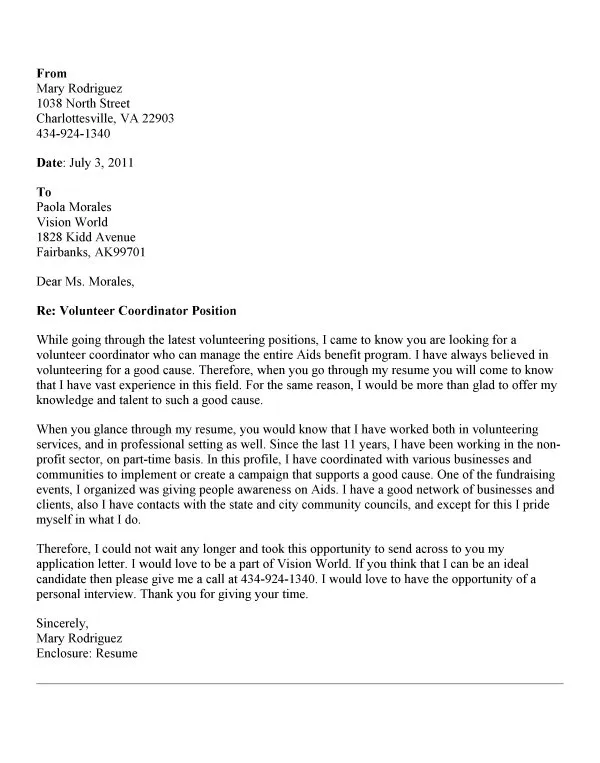
One of the core functions of a volunteer cover letter is to showcase your skills and experiences that align with the volunteer position. This is where you connect your past experiences with the needs of the organization. It is important to avoid simply listing skills and experiences from your resume; instead, you should elaborate on how your skills apply to the role. Use the cover letter to provide specific examples that demonstrate your abilities. Focus on the skills that are most relevant to the volunteer position, such as communication, teamwork, problem-solving, and organization. If you have experience in a similar field, or any relevant volunteer experience, be sure to mention it.
Tailoring Your Cover Letter
The most effective volunteer cover letters are tailored to the specific organization and the volunteer role. Avoid using a generic template; instead, personalize your letter to showcase your understanding of the organization’s mission and values. Research the organization and understand their specific needs and expectations. Make sure the cover letter should demonstrate your genuine enthusiasm for their mission. When you tailor your cover letter, the recipient will quickly notice your dedication to the organization, setting you apart from other candidates. Address the letter to the specific person who is in charge of volunteer recruitment if possible.
Researching the Organization
Before writing your cover letter, thoroughly research the organization and the volunteer position. Visit the organization’s website, review their mission statement, and learn about their programs and services. Take the time to understand the organization’s values, goals, and recent activities. Identify the specific skills, experience, and qualities they are seeking in a volunteer. This research will enable you to tailor your cover letter and effectively demonstrate how your skills and experiences align with their needs. Show them that you understand their mission and are passionate about their work. Demonstrate you are well-informed about the organization’s work.
Matching Skills to the Role
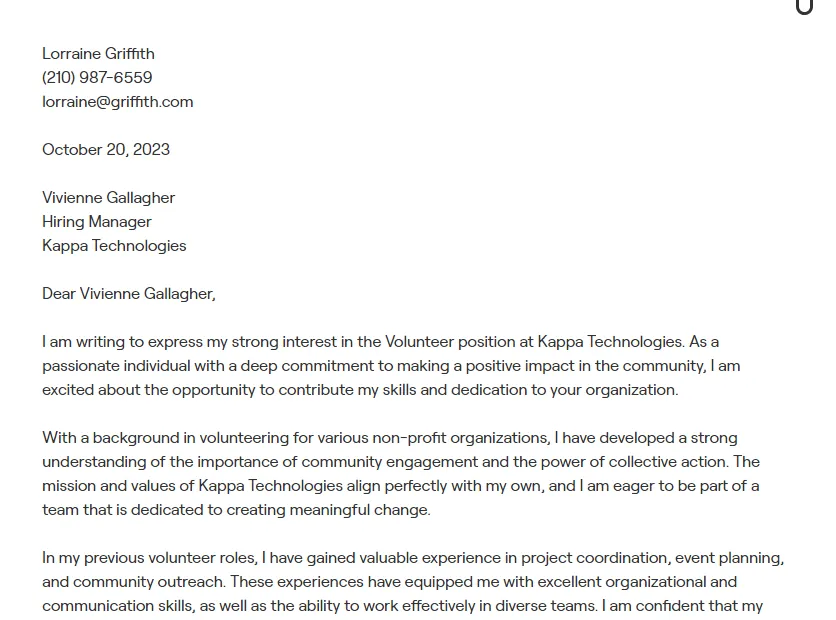
Carefully review the volunteer position description and identify the required skills and qualifications. Then, match your skills and experiences to those requirements. Explain how your previous experiences have equipped you with the necessary skills to excel in the role. Provide specific examples that demonstrate your abilities, such as communication, teamwork, problem-solving, and organization. If the role requires technical skills, such as data entry or social media management, highlight your experience with those tools. By clearly matching your skills to the role, you increase your chances of making a favorable impression and securing the volunteer position.
Crafting a Compelling Opening
The opening paragraph of your cover letter is crucial, as it sets the tone and captures the reader’s attention. Avoid generic phrases like “I am writing to express my interest.” Instead, start with a strong statement that immediately grabs the reader’s attention. State your interest in the position and your enthusiasm for the organization’s mission. Briefly mention how you learned about the opportunity. Make sure your opening clearly states the specific volunteer position you are applying for. Consider starting with a compelling anecdote or a statement that highlights your understanding of the organization’s work.
How to Start Your Cover Letter
There are several ways to start your cover letter effectively. If you know the name of the hiring manager or volunteer coordinator, use a personalized greeting, such as “Dear Mr./Ms. [Last Name].” If you do not know the name, use a general greeting, such as “Dear Hiring Manager” or “Dear Volunteer Coordinator.” In the first sentence, state the specific volunteer position you are applying for. It is important to keep the opening concise and direct. Make a strong statement about your interest in the position and how you learned about the opportunity. If you have a connection to the organization, such as a mutual contact, be sure to mention it.
Making Your Introduction Stand Out
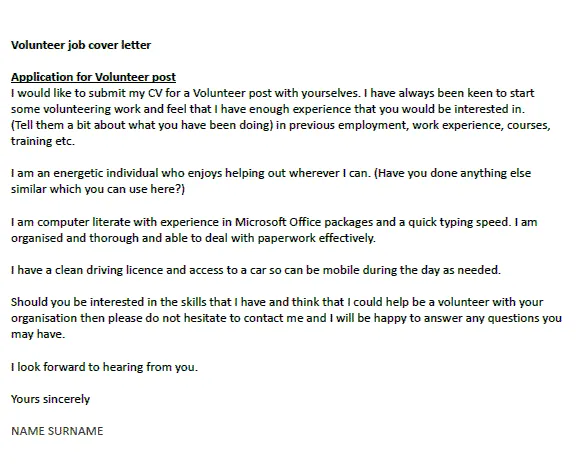
To make your introduction stand out, avoid clichés and generic phrases. Instead, start with a unique hook that captures the reader’s attention. It can be an anecdote, a quote, or a statement about your passion for the organization’s mission. Clearly express your enthusiasm and genuine interest in the cause. Briefly mention your relevant skills or experiences, especially those that align with the position. Make your introduction brief and focused, setting the stage for the rest of your cover letter. Demonstrate a good understanding of the organization’s goals and what makes the organization so important.
Writing the Body of Your Cover Letter
The body of your cover letter is where you provide detailed information about your qualifications and your interest in the volunteer position. Start by highlighting your relevant experience and skills. Use specific examples to showcase your abilities, such as teamwork, communication, and problem-solving. Quantify your accomplishments whenever possible, using numbers or data to demonstrate your impact. Explain why you are passionate about the organization’s mission and how you can contribute to their work. Make sure the body of the letter flows logically, with each paragraph building upon the previous one. Organize the body into a few paragraphs to focus on your experiences.
Showcasing Relevant Experience
Focus on the experience that is most relevant to the volunteer position. If you have previous volunteer experience, be sure to highlight it. If your experience is related to the organization’s mission, make sure to mention it. When describing your experience, use the STAR method (Situation, Task, Action, Result) to provide context and demonstrate your abilities. Clearly state the tasks you performed, the actions you took, and the results you achieved. Use action verbs to describe your experience, such as managed, organized, and coordinated. Focus on the accomplishments and skills that demonstrate your suitability for the role. Focus on your previous volunteer roles, and consider all your previous positions.
Quantifying Your Accomplishments
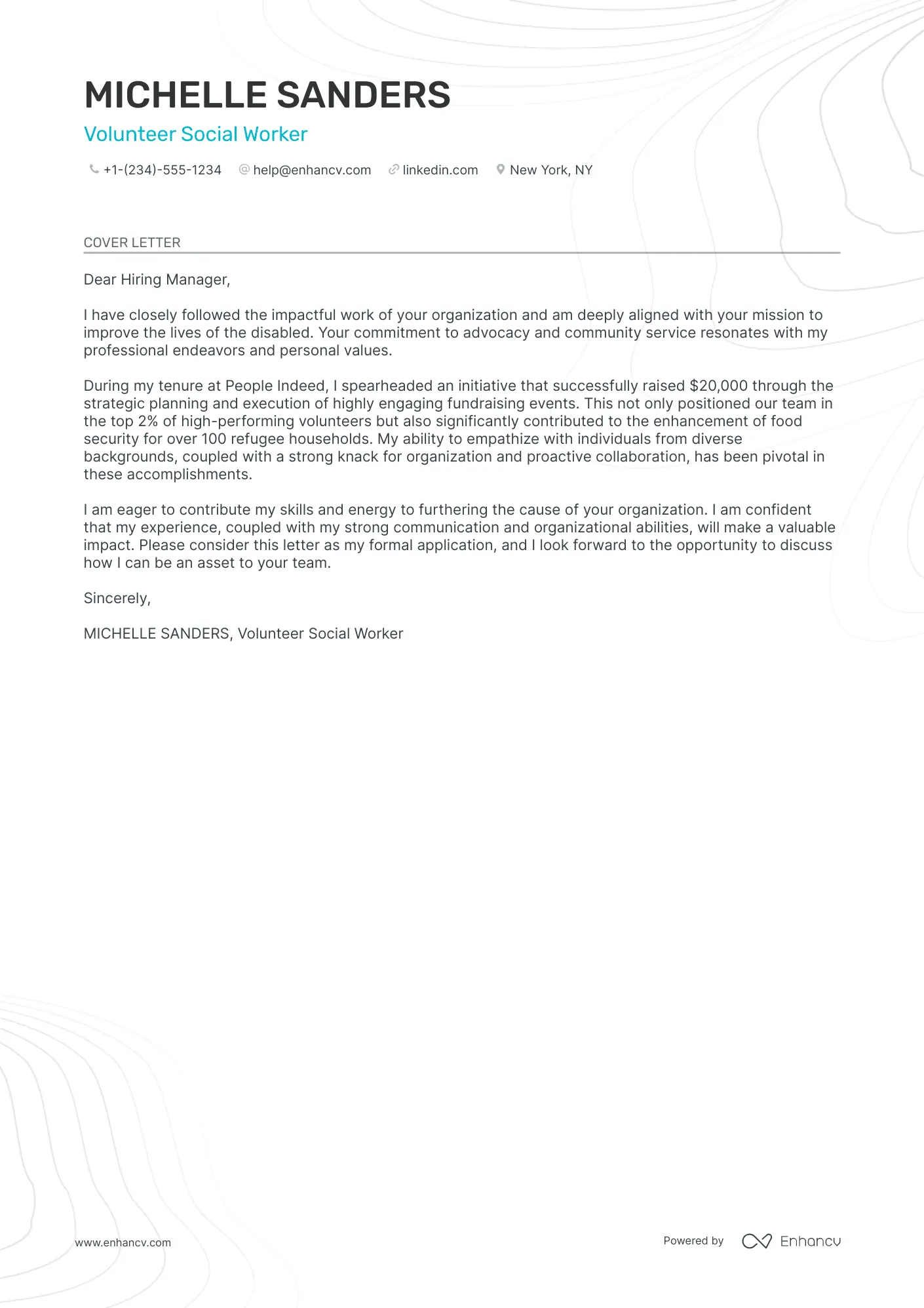
Quantifying your accomplishments in your cover letter provides concrete evidence of your abilities and impact. Use numbers and data to demonstrate your achievements. For example, instead of saying “I increased social media engagement,” say “I increased social media engagement by 30% in three months.” Provide specific examples of how you have contributed to previous organizations. Use metrics to demonstrate the positive results you achieved. Avoid vague statements and focus on providing tangible evidence of your skills. Make your accomplishments stand out by presenting them in a clear, concise, and impactful way. Providing numbers helps the reader understand the value you can bring to the organization.
Expressing Your Enthusiasm and Commitment
Your cover letter should clearly communicate your enthusiasm and commitment to the volunteer position. Show your genuine interest in the organization’s mission and express your passion for their work. Describe what motivates you to volunteer and why you are interested in this particular opportunity. Let them know why this organization is meaningful to you. Demonstrate your commitment to the cause. Assure the organization that you will be dedicated and reliable. Communicate how your skills and experiences make you a valuable volunteer. Let the organization know you are interested in the opportunity and can contribute to the cause.
Demonstrating Your Passion for the Cause
Your cover letter is an opportunity to demonstrate your passion for the cause that the organization supports. Explain why you are passionate about the issue. Share any personal experiences or motivations that have fueled your interest. If you have a connection to the cause, be sure to mention it. Show your genuine care for the community they serve. Let the organization know why this cause is important to you. The more passionately you communicate your interest, the more likely you are to be seen as a dedicated volunteer. Communicating your passion will set you apart from other applicants.
Expressing Your Availability

In your cover letter, clearly state your availability for the volunteer position. Specify the days and times you are available to volunteer. If you have any scheduling constraints, be sure to mention them. Demonstrate your flexibility and willingness to accommodate the organization’s needs. Let the organization know that you are committed to helping out. Express your willingness to commit to a regular schedule. Clearly state your availability to avoid any potential misunderstandings and demonstrates your commitment to the organization. Make sure your availability aligns with the requirements of the role and the organization’s needs. Communicate your availability in a clear and concise manner.
Closing Your Volunteer Cover Letter
The closing paragraph of your cover letter provides an opportunity to reiterate your interest and express your gratitude. End on a positive note and leave a lasting impression. Thank the reader for their time and consideration. Reiterate your interest in the volunteer position. Include a call to action, such as encouraging the reader to contact you for an interview. Make sure the closing is concise, professional, and enthusiastic. Consider using a strong closing statement that summarizes your key qualifications and why you are a good fit for the role.
Writing a Strong Closing Statement
A strong closing statement summarizes your key qualifications and reiterates your enthusiasm for the volunteer position. Briefly restate your interest in the role and the organization. Highlight the skills and experiences that make you a suitable candidate. Express your eagerness to contribute to their mission. End with a call to action, such as encouraging the reader to contact you for an interview. A strong closing statement leaves the reader with a positive impression and increases your chances of being selected. Make your closing memorable and concise.
Expressing Gratitude
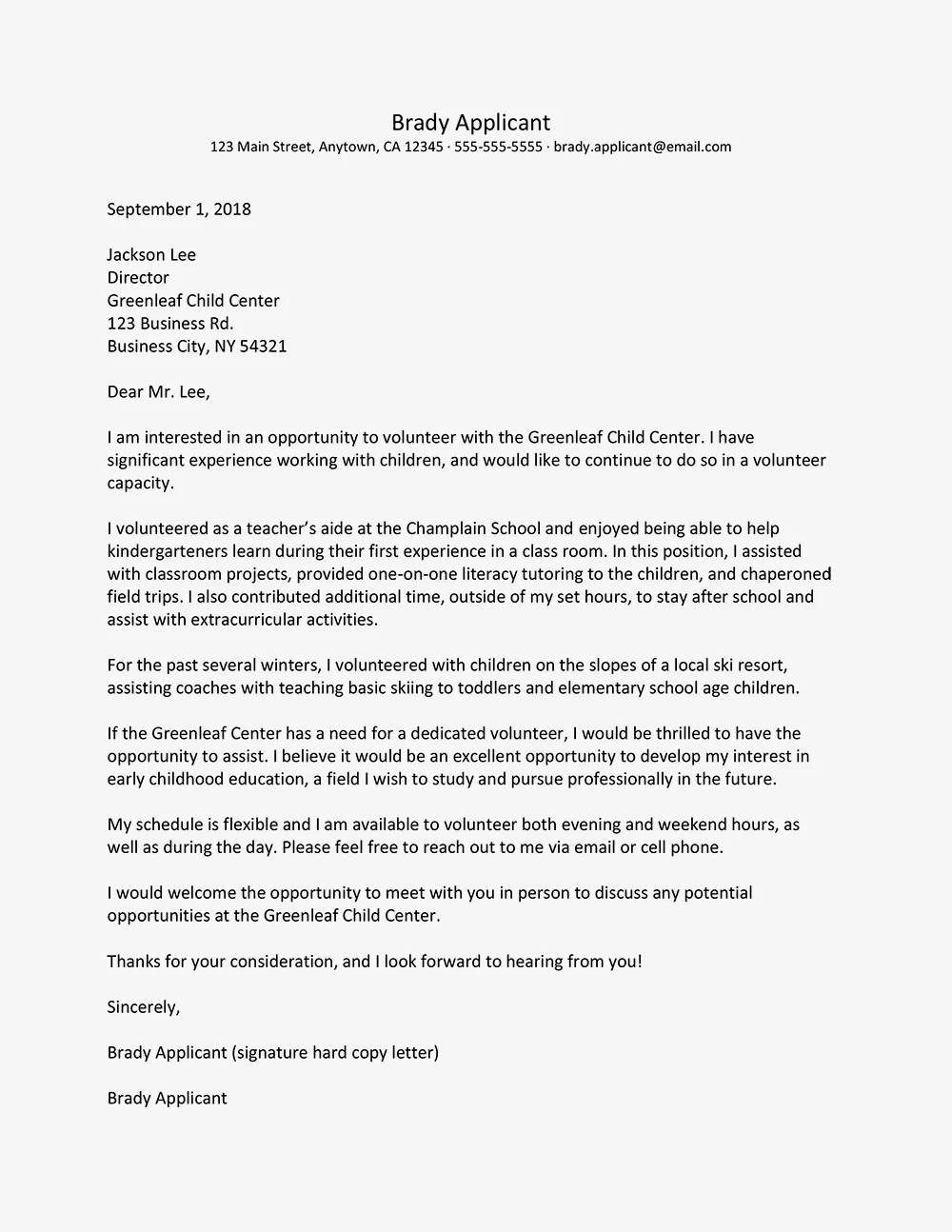
Expressing gratitude is an essential part of closing your cover letter. Thank the reader for their time and consideration. Show your appreciation for their review of your application. It is a polite and professional way to end your letter and leave a positive impression. Thank the organization for the opportunity to apply for the volunteer position. Conclude with a professional closing, such as “Sincerely” or “Thank you for your consideration.” Make sure to spell the recipient’s name correctly and use the correct title. Proofread the entire letter before sending.
Proofreading and Editing Your Cover Letter
Proofreading and editing are essential steps in ensuring your cover letter is polished and professional. Check for any grammatical errors, spelling mistakes, or typos. Review your cover letter for clarity and conciseness. Make sure the language and tone are appropriate for the organization. Have someone else review your cover letter for feedback and suggestions. Ensure your cover letter is free from errors. It’s important to present your best self to make sure that you are taken seriously. Thorough proofreading and editing will help you make a positive impression and increase your chances of getting an interview. Consider printing out your cover letter and reading it carefully.
